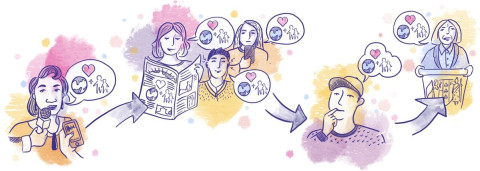
Want to improve the way we communicate and advocate?
Julian Warmington reviews training by The Workshop
The Workshop is a Wellington-based organisation teaching the art of effective messaging. In December they ran two sessions over two days. I was lucky to attend through Cycle Wellington. I’m grateful for the experience.
Attendees were from government, corporations, NGOs, and self employed freelance content producers. The focus was on understanding what kinds of messages get through to people. The first day’s session was Framing and Narratives, and the second half day was called Tactics to Respond to False Information.
I attended primarily to improve support via social media for the amazing work done in recent years by Cycle Wellington and the Wellington City Council in getting our beautiful new safe cycling roads finally established around the city.
Instructors taught many important ideas. We started immediately using the training and techniques in practice with other participants.
First they reminded us of the pitfall of ignoring basic psychology. People remember how you make them feel. To be too aggressive, angry, or confrontational is to lose a debate before it starts.
People want to feel empowered, smart, and sensible. Perhaps the strongest message to emerge from both days’ sessions was to reflect and work with the values or message of your audience. The challenge is to find a shared value or common interest, then use that as a foundation for offering a next step evolution in the audience’s thinking. We think with our hearts. We try to think rationally, but actually emotions play a huge role in our response to a topic.
Replace, don’t negate
Another key message was the power of repetition. This is a double edged sword: even to argue directly against a message by repeating a negation of that message you disagree with is to further entrench the thinking of that message in the minds of your audience. Better is to repeat exactly and only the key message you want left in the memory of your audience.
Perhaps the strongest section of the two days was the succinct masterclass on framing. The session demonstrated how narratives can work to group a set of different framings into a cohesive and powerful whole story.
Also useful to me was the succinct “cause-impact-solution” formula. I tend to overexplain and describe too much. This formula helps us keep messages simple, focused, and effective.
The second day’s session was focused on the dangers of false information. Teachers again presented a beautiful balance of theory and practicality on the pitfalls of repeating disinformation, or reinforcing misinformation.
The workshop uses recent real world media examples to show how some messages fail while others succeed in changing culture and then history. Teachers challenge participants with guided, supported exercises and feedback. The Workshop is worthwhile.
